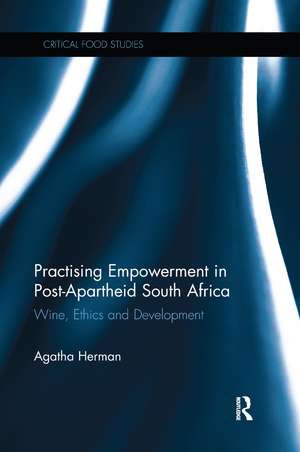Practising Empowerment in Post-Apartheid South Africa: Wine, Ethics and Development: Critical Food Studies
Autor Agatha Hermanen Limba Engleză Paperback – 31 mar 2021
Through in-depth, longitudinal fieldwork, this book considers how different ethics interact and draws attention to the positive changes and continuing development challenges faced in South Africa. Situating practice at its heart, it brings a novel, everyday and micro-scale dimension to understandings of empowerment in the post-apartheid South African wine industry. It develops a critical analysis of the interplay between practice, as scaled and inherently spatial, and discourse to conceptualise how 'big' concepts such as empowerment are articulated, materialised and experienced at the ground level. Through this, it gives voices to the marginalised who experience 'empowerment', setting these within the context of their relations with the other stakeholders who shape this engagement. This book contributes to broader critical social science debates around ethical development and questions of power and empowerment in development interventions. This is critical to reducing the disconnection between policy aims and realities within development and empowerment initiatives, as well as enabling (ethical) commodities to be strategic in retaining their appeal throughout their networks.
| Toate formatele și edițiile | Preț | Express |
|---|---|---|
| Paperback (1) | 389.38 lei 6-8 săpt. | |
| Taylor & Francis – 31 mar 2021 | 389.38 lei 6-8 săpt. | |
| Hardback (1) | 764.20 lei 6-8 săpt. | |
| Taylor & Francis – 26 iul 2017 | 764.20 lei 6-8 săpt. |
Din seria Critical Food Studies
-
 Preț: 324.68 lei
Preț: 324.68 lei -
 Preț: 265.01 lei
Preț: 265.01 lei -
 Preț: 341.57 lei
Preț: 341.57 lei -
 Preț: 310.36 lei
Preț: 310.36 lei -
 Preț: 481.76 lei
Preț: 481.76 lei -
 Preț: 435.59 lei
Preț: 435.59 lei - 17%
 Preț: 245.03 lei
Preț: 245.03 lei -
 Preț: 436.14 lei
Preț: 436.14 lei - 18%
 Preț: 1006.77 lei
Preț: 1006.77 lei -
 Preț: 389.70 lei
Preț: 389.70 lei - 12%
 Preț: 312.43 lei
Preț: 312.43 lei -
 Preț: 386.00 lei
Preț: 386.00 lei -
 Preț: 385.54 lei
Preț: 385.54 lei - 18%
 Preț: 1000.27 lei
Preț: 1000.27 lei -
 Preț: 469.34 lei
Preț: 469.34 lei -
 Preț: 489.26 lei
Preț: 489.26 lei -
 Preț: 489.48 lei
Preț: 489.48 lei -
 Preț: 498.48 lei
Preț: 498.48 lei - 18%
 Preț: 1002.99 lei
Preț: 1002.99 lei -
 Preț: 469.34 lei
Preț: 469.34 lei -
 Preț: 469.34 lei
Preț: 469.34 lei - 17%
 Preț: 272.14 lei
Preț: 272.14 lei - 18%
 Preț: 1008.30 lei
Preț: 1008.30 lei - 30%
 Preț: 848.40 lei
Preț: 848.40 lei - 18%
 Preț: 1002.36 lei
Preț: 1002.36 lei - 18%
 Preț: 997.93 lei
Preț: 997.93 lei -
 Preț: 284.52 lei
Preț: 284.52 lei - 18%
 Preț: 886.04 lei
Preț: 886.04 lei
Preț: 389.38 lei
Nou
Puncte Express: 584
Preț estimativ în valută:
74.52€ • 80.91$ • 62.59£
74.52€ • 80.91$ • 62.59£
Carte tipărită la comandă
Livrare economică 22 aprilie-06 mai
Preluare comenzi: 021 569.72.76
Specificații
ISBN-13: 9780367244095
ISBN-10: 0367244098
Pagini: 204
Ilustrații: 66
Dimensiuni: 156 x 234 x 11 mm
Greutate: 0.45 kg
Ediția:1
Editura: Taylor & Francis
Colecția Routledge
Seria Critical Food Studies
Locul publicării:Oxford, United Kingdom
ISBN-10: 0367244098
Pagini: 204
Ilustrații: 66
Dimensiuni: 156 x 234 x 11 mm
Greutate: 0.45 kg
Ediția:1
Editura: Taylor & Francis
Colecția Routledge
Seria Critical Food Studies
Locul publicării:Oxford, United Kingdom
Cuprins
1. Introduction: conceptualising power, practice and empowerment through South Africa 2. The South African Wine Industry: conflict and continuity 3. Local Practices of Empowerment in South Africa’s Wine Industry: difference and dilemmas 4. Practicing Empowerment as Development in South African Fairtrade 5. Strategic Practices: interactive relations and the role of the market in ethical trade 6. Whose Empowerment? Materiality and the Marginalised in the South African Wine Industry 7. Conclusions: practising empowerment and empowering practices in South Africa 8. References
Notă biografică
Agatha Herman is a Lecturer in Human Geography at Cardiff University, UK and holds a Leverhulme Trust Early Career Fellowship (2014-17). Her research interests focus on questions of ethics, justice and resilience within food production systems, particularly analysing their impact on the everyday spaces, practices and livelihoods of producers.
Descriere
Analysing empowerment within the context of certified Fairtrade wine plantations, this book considers how different ethics interact and draws attention to the continuing development challenges faced in South Africa. It gives voices to the marginalised who experience 'empowerment' within the context of their relations with the other stakeholders who shape this engagement. It thus contributes to broader critical social science debates around ethical development and questions of power and empowerment in development interventions. It will be a key resource for those working in development studies, post-colonial studies, environmental geography and politics.
